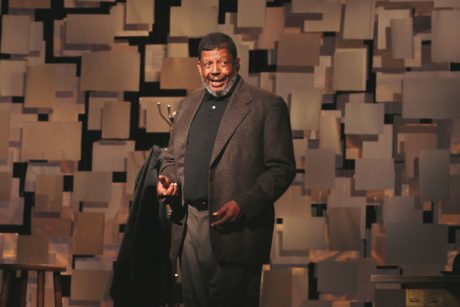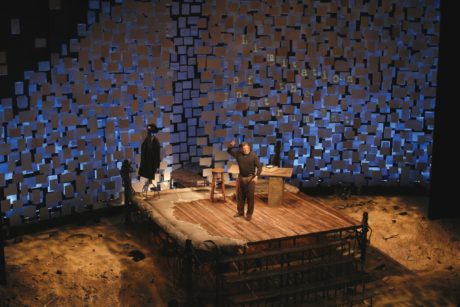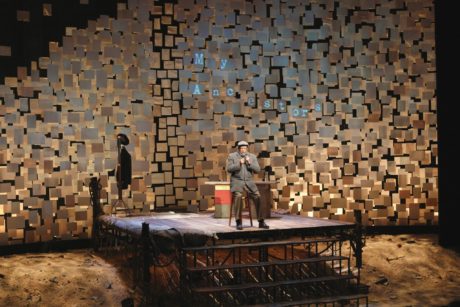August Wilson was a high school dropout who went on to receive two Pulitzer Prizes for Drama and he’s regarded as one of the five most celebrated playwrights in the history of American theater. After seeing Round House Theatre’s magnificent opening night production of August Wilson’s How I Learned What I Learned, co-conceived and directed by Todd Kreidler, I was stunned into asking myself what exactly did a 10th-grade dropout contribute to American culture to have such a profound impact on its artistic expression? What surfaced for me was the awareness that August Wilson’s raw, brutal honesty about the Black Experience in America raises the consciousness in ways that heal, connect, and challenge every man to find common ground – our shared humanity. And the quest never ends.

A native of Pittsburgh, Pennsylvania, August Wilson used not only the mean streets but also the all-important Pittsburgh Public Library to teach himself what he needed to learn about how to make it as a Black man in 20th century America. With an innate native intelligence and intellectual curiosity that relentlessly strove to overcome the “limitations of the instruments” of artistic expression, Wilson succeeded in setting free the thoughts and feelings of the tragicomedy of Black America as a springboard for storytelling. Through a razor-sharp lens into the human condition, August Wilson shined a light on America as it struggled and, unfortunately, continues to struggle to overcome its strained heritage.
The full title of August Wilson’s only autobiographical work is How I Learned What I Learned (and How What I Learned Has Led Me to Places I’ve Wanted to Go. That I Have Sometimes Gone Unwillingly Is the Crucible in Which Many a Work of Art Has Been Fired. Yes, that’s a mouthful, but it gives more than a hint into the richness of this one-person show.
With Paul Robeson’s booming voice in the background singing “What is America?” and with Eugene Lee, narrator for How I Learned wearing a tee-shirt emblazoned with the words, “I Am Supposed to be White” as entree, the show courageously leans into an evening of profound wit and wisdom as it blows the doors wide open into the heart of an American genius.
How I Learned is essentially a one-act monologue that gives wonderful glimpses into the formative life circumstances that had the strongest influences on shaping August Wilson, the playwright. It tells stories of the colorful characters who served him up the rich food from which Wilson concocted the deliciously delightful theatrical stews that continue to make his works some of the most oft produced plays on stages everywhere and now in film.
Jitney, August Wilson’s first play of the series just received the 2017 Tony Award for best revived play; and Fences received Oscar recognition this year with Denzel Washington and Viola Davis receiving nominations and awards.
Director Todd Kreidler who co-conceived How I Learned alongside August Wilson authentically presents the man. Todd had the good fortune of knowing Wilson personally and developing a warmly close friendship and professional relationship during the last five years of his life.

Kreidler was in his early 20s when he met and began collaborating with August Wilson. He gave dramatic shape and scripted form to the stories that August Wilson wanted to tell about his early years as a self-proclaimed poet growing up in the poor Hill District of Pittsburgh when Wilson was in his 20s. Kreidler also directed August Wilson who played himself in How I Learned through one production run of 10 shows in Seattle Washington in 2003.
How I Learned is true to who August Wilson was in many ways. Creative Consultant and Costume Designer Constanza Romero was married to August Wilson during the last decade of his life up until his death in 2005. Both Kreidler and Romero were on hand for the performance and after-party on opening night.
Actor Eugene Lee has performed eight of August Wilson’s American Century Cycle, a series of 10 plays about the Black American experience through each decade of the 20th century. Lee was Todd Kreidler’s perfect choice in his search for an actor who could not only personify August Wilson but also become the characters in Wilson’s life stories. Lee projects all of the passion, the eloquence and the proud presence of August Wilson. And being a writer too, Eugene Lee is a great storyteller with that perfect inflection and timing that all gifted storytellers seem to possess.
Lee appeared to effortlessly unfold stories of how August Wilson became August Wilson over the course of his brief 60 years through an intimate kind of energetically poised presence. And Lee believably made the leap from August Wilson, the poor, struggling poet who inevitably gravitated toward the arts community in Pittsburgh and Minneapolis to Wilson’s becoming one of the most influential playwrights of our time. Eugene Lee’s performance is simply superb.
It is the mark of the consummate actor who can give life to many lives in the span of one evening at the theater and still hold your attention — flying solo! But Eugene Lee pulled it off with flying colors and I hung on every word in anticipation of just what was going to happen next in the drama-laden life of August Wilson. It was like watching reality TV on steroids but steeped in profound meaning and purpose.
How I Learned creates an artistic collage of the tragedies and the comedies of a full but perhaps unfinished life: August Wilson’s first kiss; a Catholic school play with Sister Mary yelling in the background when August forgets his largely unforgettable part as a cymbal-clasher; his first menial jobs as stock boy, gardener, and dishwasher; his first relationship with a lusty, reefer-smoking married woman; his first time going to jail (for doing nothing) and many other poignant moments.
This is how August Wilson learned the what of life—through uncompromising stories about human nature and what it meant for August Wilson to be a Black man in America. He had a gift for words, for sure, and he melded that wit and wisdom into a body of work that will surely continue to be presented on stages and in film for years to come.
How I Learned resplendently shows us truth of through the eyes of an African American who experienced racial hostility, bigotry, inequality and stark poverty. Yet through it all, he was always able to find something within himself that proudly proclaimed, “We are an African people with an honorable history.” Proudly referencing slavery with humor, he said, “My ancestors always had a job!”

August Wilson demanded respect and refused to be stunted by America’s moral challenge to be true to its founding principles. “I quit” was on the tip of his tongue to any bosses who trod upon his sense of self-worth. It is really not surprising that he went on to become who he became. It was there all the time waiting to be unleashed and for the world to enjoy.
The set for How I Learned is filled with symbols depicting August Wilson’s life experiences. Dramaturg Gabrielle Hoyt comments on Scenic and Projection Designer David Gallo’s “treasures in trash” with a set that looked like an abandoned dirt lot filled with bits and pieces of seemingly worthless buckets of nails, rags, bald tires and other debris from the Pittsburgh Hill District, when she said, “… people’s trash contains remnants of their stories.” The shape of the stage platform itself looked like a boxing ring—Wilson saw his life as a struggle. And a backdrop of 5,555 sheets of floor-to-ceiling writing paper symbolically and graphically projected moments in his life as a writer. These sheets pay tribute to August Wilson’s penchant for writing down ideas for plays on, “… legal pads, envelopes, napkins and checks.”
August Wilson had a profound understanding of the African American experience. He breathed in its culture and exhaled the life he observed life through the cheap bars, juke joints and smack-talk cafes in the Black community he frequented. But he wrote with compassion and authenticity that conspire and compel everyone to see the unity of our humanity. August Wilson’s How I Learned What I Learned will touch and inspire you. Don’t miss it.
Wowee, Round House! You have mounted a masterpiece about an American master.
Running Time: One hour and 35 minutes, with no intermission.
How I Learned What I Learned plays through July 2, 2017, at Round House Theatre – 4545 East-West Highway, in Bethesda, MD. For tickets, call the box office at (240) 644-1100, or purchase them online.





